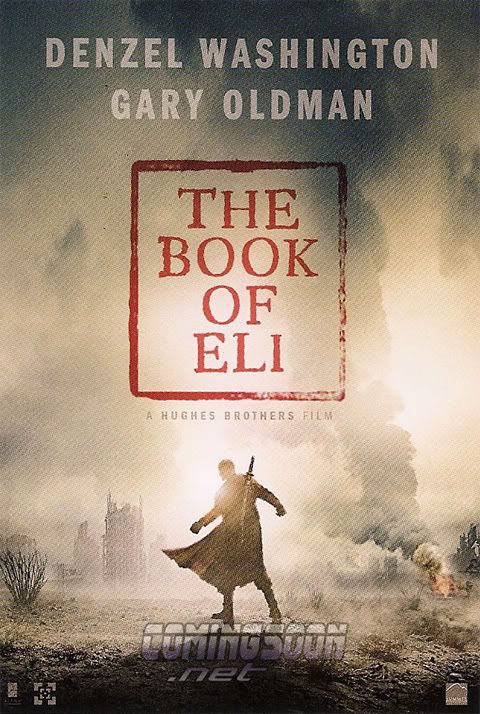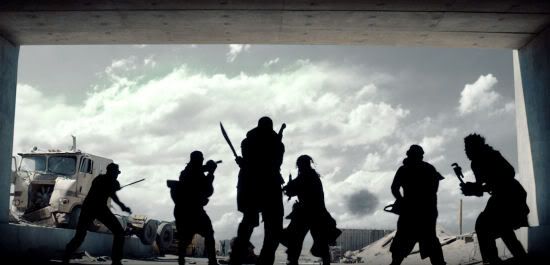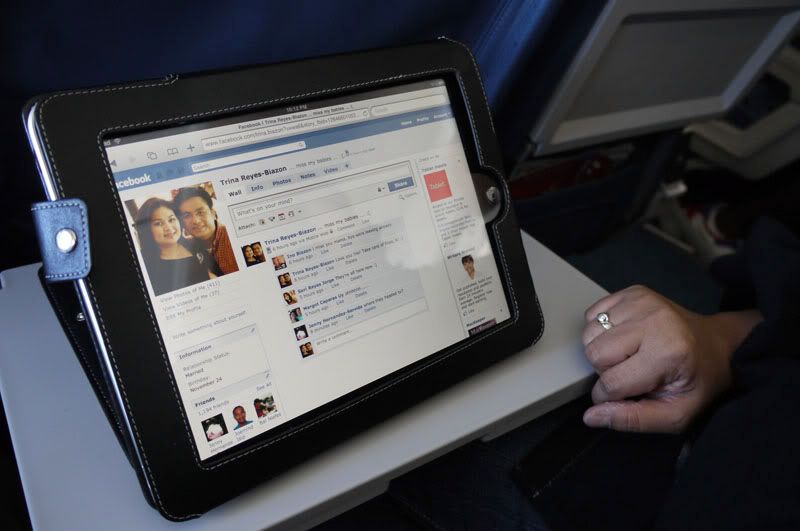WARNING! Spoiler alert! Do not proceed if you don't want to find out the ending of the movie!

My Saturday afternoon was free, there was no place to go. The kids had their cousins sleeping over so I had no place to squeeze in and play with them. I couldn’t do Facebook and Twitter lest I be called an addict (but you can call me in denial). So what else was there to do?
I declared Saturday afternoon as movie time. After all, there are quite a number of good movies these days and with the various sources available (legit DVD, pirated DVD, online sources, relatives and friends) it’s easy to choose which one to watch.
Of course, being the “macho man” that I am, I have preference for action films. And being a self-styled movie critic, I also choose movies based on who directed the film. And the Hollywood fan in me does not pass the chance to watch movies starring actors and actresses that I adore.
So among the available choices that afternoon, I chose a movie which had a trailer that teased my desire for an adrenaline rush, directors who had already proven to me that they are worth the money that producers pay them to make a film and a lead actor who ranks on top of my all-time Hollywood favorites.
My chosen movie for that Saturday afternoon was The Book of Eli, directed by the Hughes Brothers with Denzel Washington as the lead character.
The trailer that I had seen months before gave me an idea that the movie’s setting was post-apocaloyptic, very much like Mel Gibson’s Mad Max series and last year’s The Road, which I have yet to watch. To me, post-apocalypse movies tend to have similar looks and storylines. The protagonist is usually plunged into a conflict with the desolate and cruel environment as well the deranged and despicable character that live in it. There is usually a journey involved which is made exciting by fights, gunfire and explosions.
But in this case, aside from the actor starring in it, the scenes in the preview and the title of the movie gave me an inkling that somehow there will be a lesson learned here, not just the adrenaline of blood-squirting action and foul language in the script.
The title, Book of Eli, immediately gave me the impression that the Bible has something to do with it. Eli is the shortened version of the name Elijah. In American culture, those who named their sons Elijah are usually those who come from the Bible Belt (the Southern part of the US) and those familiar with the prophet. Being a Bible-reader/believer myself, not to mention a Denzel Washington fan, I had an immediate interest in the movie.
The story revolves around Eli (played by Denzel Washington) who was a survivor of an event which led to the destruction of civilized life as we know it. The land was destroyed, anarchy reigned and cannibals roamed the countryside. It was the period after an event which may have been Armageddon itself. Not only did it destroy man’s home, it destroyed humanity itself. Violence ruled, and every person lived only for survival.
Eli, who was living in the East Coast of the US, one day receives a message presumably from God. The voice told him to bring the book west, and that a path would be laid out before him, that he would be led to a place where the book would be safe, and that he would be protected anyone or anything that would be in his way. During a conversation with one of the characters, he described the encounter with the voice : “I was just moving from place to place,trying to stay alive.And then one day I heard this voice.I don't know how to explain it, it's like it was coming from inside me. But I could hear it clear as day. Clear as I can hear you talking to me now.”
That basically describes how those who have had the faith to hear the word of God get the message from God. Nowadays, whenever someone says, “God told me to do this”, that person is greeted with either patronizing looks or ridiculing snickers. Often, that person is tagged as having loose screws.
But a person who is in the appropriate level of faith and has a clear idea of God’s will and purpose will be able to hear the Word of God, as clear as one can hear another person talk. How do you know what God’s will and purpose is? Simple. Just read the Bible.
And that’s what Eli has been doing. He told Solara that he’s been reading the Bible everyday. In the past thirty years that he’s been wandering, he’s been reading the book in his possession everyday. Reading it revealed to him God’s will and purpose and it filled his faith, faith which gave him direction to where he was suppose to go. In a conversation with Solara, this was what he had to say about faith:
Solara: You know, you say you've been walking for thirty years, right?
Eli: Right.
Solara: Have you ever thought that maybe you were lost?
Eli: Nope.
Solara: Well, how do you know that you're walking in the right direction?
Eli: I walk by faith, not by sight.
Solara: [sighs] What does that mean?
Eli: It means that you know something thing even if you don't know something.
Solara: That doesn't make any sense.
Eli: It doesn't have to make sense. It's faith, it's faith.
And he’s right. Faith doesn’t need to be rationalized, otherwise, it is not faith at all.
So as he journeyed for thirty years on the way to where he was told the book should be brought, it is assumed that he learned his survival skills as he went along. In one of the early scenes of the movie, he encounters people called Hi-Jackers, who apparently prey on travelers, not only to ransack their belongings but also to eat them.

Eli was lured by their bait, a woman pretending to need his help on the side of the road. Being the good natured man that he was, Eli was drawn by the bait and it was then that he was encountered by the gang. He tried to evade but was forced into a fight with them, one man against many. In the end, they all end up dead, with him fulfilling his warning to the leader , “Touch me with that hand again and you’re not getting it back”. Eli cut off his hand with one swoop of his bolo.
Thirty years is a long time to endure to reach your goal. Yet Eli continued in his journey fraught with danger and death in order to fulfill his mission. It takes great faith to embark on a journey with no end in sight. That was what the Israelites did when they fled Egypt. Through the leadership of Moses, they walked for forty years through the desert until reaching the Promised Land. They almost lost faith but because of their leaders’ belief in what lay ahead, they avoided falling into self-destruction. Of course, had they been more faithful to God, their journey should have just been forty days.
In many instances, we are impatient with what we seek. Many times people have prayed to God and wanted results overnight. But God does not work within the time limit we prescribe. Our impatience usually gets the best of us, as exemplified by the cliché, “haste makes waste”. We must understand that sometimes what we desire comes to us delayed because the timing is not right.
One of the reasons that our desires are delayed is that we have yet to be prepared for what we ask. For instance, we don’t get a high paying job immediately after we graduate because we still have to build up experience in the practical world.
In Eli’s case, he did not reach his destination immediately but his long journey prepared him for the challenge that he was to face in the fulfillment of his duty. His fighting skills were honed roaming the ravaged land and encountering various obstacles and dangers. While stayed true to his objective of reaching the west coast, he didn’t know that someday he would encounter someone who was determined to take the book for himself and do everything and anything to get it.
But his long journey prepared him for destiny crossing paths with Carnegie, a character who knew the relevance of the book that Eli was carrying. Carnegie was the leader of a band of violent bikers ruling over a small town. He had control of everything, including one of the most precious resources, water.
But he wanted more, and he believed that the book is the key to gaining power. He even had gangs of bikers going around the countryside looking for the book. One time he was asked by one of his lackeys why they were being sent out just for a “f*#king book”.
Carnegie answered, “IT'S NOT A F*#KIN' BOOK! IT'S A WEAPON. A weapon aimed right at the hearts and minds of the weak and the desperate. It will give us control of them. If we want to rule more than one small, fuckin' town, we have to have it. People will come from all over, they'll do exactly what I tell 'em if the words are from the book. It's happened before and it'll happen again. All we need is that book.”
Indeed, the power of the Words in the Bible has been proven. It motivates people, it drives revolutions and it has conquered countries, shaped civilization. A weapon, indeed. But just like any weapon, if not used properly in the way it is meant to be, it can also bring misery to people. Carnegie’s desire to use for his personal agenda is not fiction. We have seen many times when those claiming to be working in God’s name using his Words have in fact been working for their own vested interests. The Bible itself warns us about those kinds of people.
But one of the important messages in the movie regarding the Bible and the Word of God is that the power one gets from it is not in the mere possession of the Book. As Carnegie found out in the end after he was able to get the Book from Eli through force, violence and intimidation, the book is no different from any other pocketbook or magazine if the heart of the one reading it is not in the right disposition. To the evil, the truth in it may be distorted for evil purposes, and to those who lack faith, it is but a mere collection of words and stories that mean nothing.
When Eli and Solara were besieged by Carnegie and his gang, Solara ended up being hostaged by Carnegie and by threatening to kill her, he was able to get Eli to surrender the book. Carnegie then shoots Eli and goes back to his den.
Back home, he is unable to open the locked book, and has to enlist the help of one they call “the Engineer” who then picks the lock and open it. To his surprise and anguish, it turns out that the Bible is a Braille version of the book. It is then that the moviegoer is led to the conclusion that Eli was blind, in spite of having been able to go through his 30 year journey and overcome all the obstacles and challenges.
The worst thing for Carnegie is that the only one who could possibly read it is his blind lover Claudia but whom he has been maltreating over the years. HE asks her to read it for him, but she realizes that she doesn’t have to. With his wounded leg becoming gangrenous, it won’t be long before he kicks the bucket. She mocks him, saying, “You sacrificed so much for that book. So many men. More than you can spare. And now, all the people who were afraid to speak your name, they're downstairs, tearing up the bar right now, did you know that? And there's nobody to stop them. And you're feverish. I can't imagine what it must feels like, to have something so close, that you worked so hard for, and it might as well be a million miles away.”
Indeed, many have Bibles in their possession yet they either do not read it or they do not comprehend what it is all about. They are blind and ignorant to the message of Truth in the Bible because they lack the necessary attitude and faith needed to understand what is being conveyed.
But the most relevant and striking message is in the end. With the Book in Carnegie’s hands, the moviegoer would think that Eli had already failed his mission. He goes on the West Coast in spite of a bullet wound in his belly and reaches the destination---the island prison of Alcatraz in San Francisco Bay, which apparently has been turned into a secure repository of culture and literature. He is able to gain entry into the heavily guarded fortress-library by saying that he has the King James Bible with him.
The curator welcomes him and says that the Bible is the only book they do not have since the apocalypse happened. Eli then asks the curator to get some paper (“lots of ‘em”) and instructs him to write down everything he will say, word for word. He then starts to recite the New King James Version of the Bible beginning with Genesis, Chapter 1, Verse 1. “In the beginning God created the heaven and earth…”
The message is that the Word of God should not just remain on paper and be one of our possessions as we go through this life. It must be taken in and given a place in our hearts, because only then will it bear fruit in our lives. Paper and ink may be erased or destroyed, but words committed to our memory and its meanings and purposes embedded in our hearts will never be lost nor destroyed.
The Word becomes living when we pass it on to another, not just by the physical transfer of possession by inheritance or gifts, but by teaching others about its wisdom and truth. And by teaching, it is not just by dictation or repetition but more effectively by living it through our daily lives.
Eli says this so profoundly when he told Solara, “In all these years I've been carrying it and reading it every day, I got so caught up in keeping it safe that I forgot to live by what I learned from it. To do more for others than you do for yourself.”

In the final analysis, Eli is us and we are all Elis. We are called to bring the word to where it is safe--- in the hearts of our fellow man. We are called not to keep the Word in a bookshelf to gather dust but to pass it on. But before we embark on that mission, we must put the Word in our hearts and live by it. Otherwise, we might end up like Carnegie, living our lives chasing after the wisdom of the Word until we exhaust our last breath.






